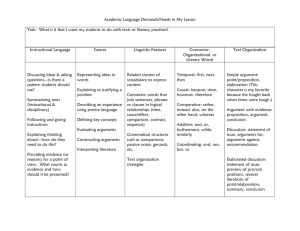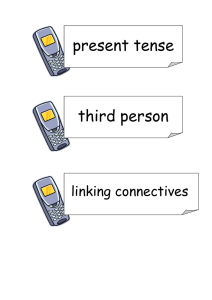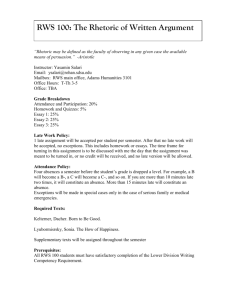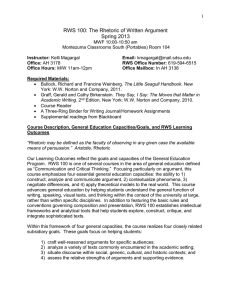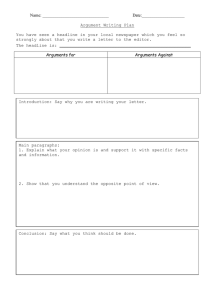RWS 200: The Rhetoric of Written Arguments in Context Zombie Edition
advertisement
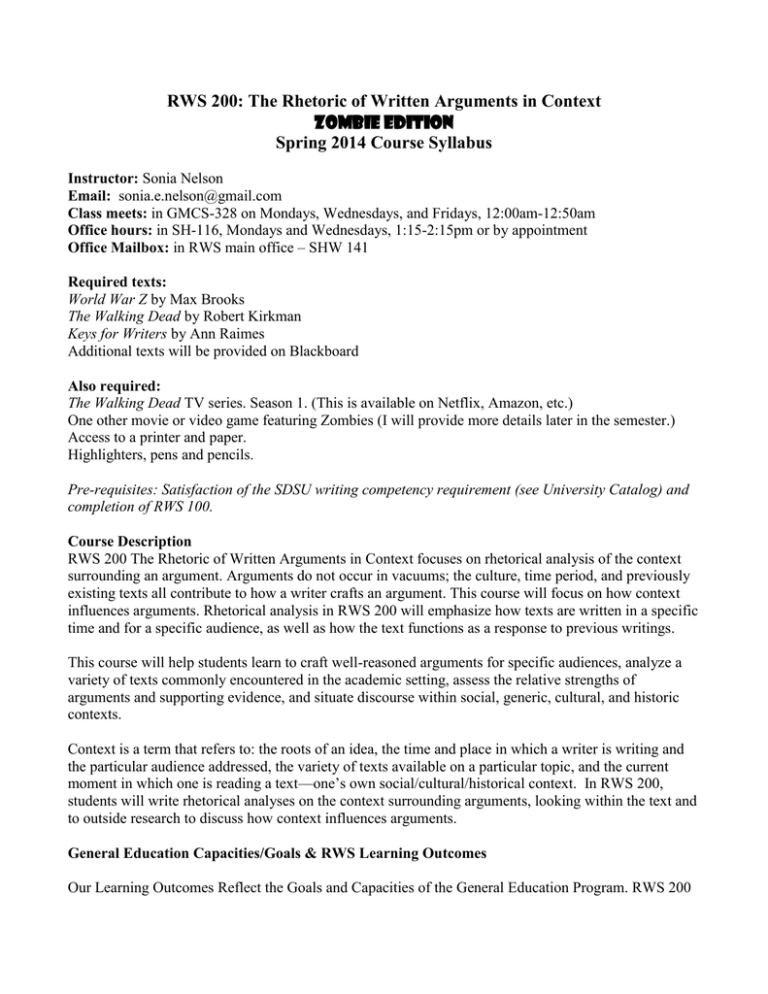
RWS 200: The Rhetoric of Written Arguments in Context Zombie Edition Spring 2014 Course Syllabus Instructor: Sonia Nelson Email: sonia.e.nelson@gmail.com Class meets: in GMCS-328 on Mondays, Wednesdays, and Fridays, 12:00am-12:50am Office hours: in SH-116, Mondays and Wednesdays, 1:15-2:15pm or by appointment Office Mailbox: in RWS main office – SHW 141 Required texts: World War Z by Max Brooks The Walking Dead by Robert Kirkman Keys for Writers by Ann Raimes Additional texts will be provided on Blackboard Also required: The Walking Dead TV series. Season 1. (This is available on Netflix, Amazon, etc.) One other movie or video game featuring Zombies (I will provide more details later in the semester.) Access to a printer and paper. Highlighters, pens and pencils. Pre-requisites: Satisfaction of the SDSU writing competency requirement (see University Catalog) and completion of RWS 100. Course Description RWS 200 The Rhetoric of Written Arguments in Context focuses on rhetorical analysis of the context surrounding an argument. Arguments do not occur in vacuums; the culture, time period, and previously existing texts all contribute to how a writer crafts an argument. This course will focus on how context influences arguments. Rhetorical analysis in RWS 200 will emphasize how texts are written in a specific time and for a specific audience, as well as how the text functions as a response to previous writings. This course will help students learn to craft well-reasoned arguments for specific audiences, analyze a variety of texts commonly encountered in the academic setting, assess the relative strengths of arguments and supporting evidence, and situate discourse within social, generic, cultural, and historic contexts. Context is a term that refers to: the roots of an idea, the time and place in which a writer is writing and the particular audience addressed, the variety of texts available on a particular topic, and the current moment in which one is reading a text—one’s own social/cultural/historical context. In RWS 200, students will write rhetorical analyses on the context surrounding arguments, looking within the text and to outside research to discuss how context influences arguments. General Education Capacities/Goals & RWS Learning Outcomes Our Learning Outcomes Reflect the Goals and Capacities of the General Education Program. RWS 200 is one of several courses in the area of general education defined as “Communication and Critical Thinking.” Focusing particularly on argument, this course emphasizes four essential general education capacities: the ability to 1) construct, analyze and communicate argument, 2) contextualize phenomena, 3) negotiate differences, and 4) apply theoretical models to the real world. This course advances general education by helping students understand the general function of writing, speaking, visual texts, and thinking within the context of the university at large, rather than within specific disciplines. In addition to featuring the basic rules and conventions governing composition and presentation, RWS 200 establishes intellectual frameworks and analytical tools that help students explore, construct, critique, and integrate sophisticated texts. Within this framework of four general capacities, the course realizes four closely related subsidiary goals. These goals focus on helping students 1) 2) 3) 4) craft well-reasoned arguments for specific audiences; analyze a variety of texts commonly encountered in the academic setting; situate discourse within social, generic, cultural, and historic contexts; and assess the relative strengths of arguments and supporting evidence. Our student learning outcomes for RWS 200 are closely aligned with these goals and capacities, and reflect the program’s overall objective of helping students attain “essential skills that underlie all university education. Course Objectives Throughout the semester, you will engage in reading and writing assignments and discussions, which will encourage mastery of the following learning outcomes. In addition to the four learning outcomes specific to the four assignments, by the completion of this course you should be able to: 1. Construct an account of an argument and identify elements of context embedded in it, the clues that show what the argument is responding to--both in the sense of what has come before it and in the sense that it is written for an audience in a particular time and place; examine a writer’s language in relation to audience, context and community; 2. follow avenues of investigation that are opened by noticing elements of context; research those elements and show how one's understanding of the argument is developed, changed, or evolved by looking into its context; 3. given the common concerns of two or more arguments, discuss how the claims of these arguments illustrate, extend, modify, complicate, clarify or qualify one another; 4. consider their contemporary, current life as the context within which they are reading the arguments assigned in the class; position themselves in relation to these arguments and additional ones they have researched in order to make an argument; draw on available key terms, concepts or frameworks of analysis to help shape the argument. Outcomes across the semester: in addition to the first four outcomes which will be covered as the writing projects, the following points describe outcomes to work on throughout the semester, to be attained over the 15 weeks. Building on the work done in RWS 100, students will be able to: 5. articulate what argument a text is making; describe the work that is done by each section of the argument; describe elements of the argument—claims, methods of development, kinds of evidence, persuasive appeals; translate an argument into their own words; 6. understand and incorporate all aspects of the writing process--including prewriting, drafting, revising, editing, and proofreading; 7. articulate what key terms, definitions, concepts, statements of a problem or issue are established by a text; 8. investigate and articulate how an argument is positioned—based on certain kinds of assumptions, located in a way of thinking and representing issues from a point of view; 9. work with multiples sources in a paper, deciding what to include and what to exclude, choosing an effective structure, and creating significant relationships among sources; 10. analyze and assess arguments made by visual texts; incorporate visual images into their documents; 11. craft a cohesive paper, and use effective metadiscourse to articulate the project of the paper and guide a reader through it; 12. describe their own papers and reflect on how they wrote them; differentiate between the content of their texts and the language and rhetorical strategies they employ; 13. assign significance to the arguments they read; 14. revise their own work effectively, re-reading previous work and re-envisioning it in the light of reflection, feedback, further reading and new sources of information; 15. edit their writing for the grammar and usage conventions appropriate to the project. REQUIREMENTS Essays: You will be required to write 4 essays for this course. Each essay will require at least one rough draft. All pre-writing and rough drafts are due in class on the day specified. Final drafts are due to Turn-it-In on the date specified, and on paper the following class to me. Specific criteria for each essay will be given along with the prompt. I will not accept late work. If there are extreme circumstances or emergencies, they will be addressed on a case-by-case basis before the due date. Journals: You will have journal exercises either in class or as a discussion on blackboard. Each journal assignment will be used as a tool to better understand the texts, assignments, or concepts worked on in class. Workshops: One or more drafts will be required for each writing assignment. You will “workshop” the essay with your peers, both gaining and giving feedback. You will complete feedback forms in peer review and be evaluated based on evidence of engagement in the activity. Conferencing: You are required to meet with me 2 times throughout the semester to discuss your rough drafts. You must bring all pertinent materials to your conference. I cannot emphasize enough the importance of meeting with me to discuss your papers. This is a chance to get one-on-one assistance and a clearer idea of my expectations for each paper. If you would like to meet with me more than twice, please do not hesitate to come during my office hours or make an appointment. Participation: You are expected to participate actively in class. Although this does not mean speaking up and contributing valuable insight during every class session, it does mean arriving on time and being prepared, paying attention, and being involved. You could be called on to answer a question at any time, so please be prepared! As long as you’ve done your assigned work, it will not be difficult. Printouts: You are required to bring articles and other printed materials to class; this includes any article provided on blackboard and any paper you are working on. POLICIES Respect: The best classroom experience comes from students respecting each other and the instructor. This includes everything from coming to class on time, refraining from private conversations during class, to texting during a lecture. Please silence your cell phones when you come to class, and if you find it necessary to text or make a call, go outside. Because we will be interacting in group discussion often, the use of laptops will also be distracting. Students that would like to use laptops are encouraged to discuss the specific need with me in advance. You are encouraged to join in class discussions, but refrain from using obscene or offensive language and interrupting others. E-mail: Please use your resources first (blackboard, the syllabus), but feel free to e-mail me anytime. I will respond as quickly as possible. However, I may not respond as quickly on nights and weekends. Attendance: There is no substitute for attending class. Students are expected to attend all classes, and attendance will be taken. You are allowed three absences without penalty. However, after the third absence, your grade will lower by one-half letter grade per absence. You will not be allowed to make up any quizzes or journals given on the day of your absence. Essays: All rough drafts are due (in completion) as a hard copy in class on the date specified. You must turn in a complete rough draft in order to turn in a final paper. All essays must be typed, adhere to MLA format (12 point font, double space, times new roman, proper heading) and stapled. You will find more information on MLA listed on blackboard. Essay pre-writing and drafts will not be graded as a final draft, but will receive points for completion. Late assignments will not be accepted. For emergency cases, late work may be accepted up to one week following the printed deadline and will be subjected to a grade penalty. Re-Writes: Students may choose to re-write ONE essay after receiving a grade for the assignment. You may revise any paper for which you receive a grade lower than a C. Essay re-writes may be submitted up to one week after I hand back your graded essays. The grade given on the re-write will be averaged with the grade given on the previous draft. You must initiate the re-write process. I will not remind you. Electronics: Your active participation is required in this course. Please turn off your cell phones, iPods, and other electronic equipment when you come to class. If I notice you are using an electronic device during class, you will be marked absent for the day and not receive any participation points (unless we have made a prearrangement). Plagiarism: Plagiarism includes: copying the ideas or writings of someone else and claiming it as your own work, collaborating with someone else on an assignment, and/or resubmitting work that you have done for another class. DON’T DO IT. Anyone caught plagiarizing will not only fail that assignment, but is likely to fail the class and will also face disciplinary action in accordance with the San Diego State University policy. You are responsible for reviewing SDSU’s policy on academic dishonesty at http://csrr.sdsu.edu. Turnitin Policy: Turnitin (integrated within Blackboard) will be used in this course for many assignments. Students in this course agree that papers are subject to submission for textual similarity review to Turnitin.com for the detection of plagiarism, as well as for online evaluation, feedback and grading by the instructor, and peer review by fellow class members. All submitted papers will be included as source documents in the Turnitin.com reference database solely for the purpose of detecting plagiarism of such papers. Students may submit their papers in such a way that no identifying information about them is included. Another option is that a student may request, in writing, that his/her papers not be submitted to Turnitin.com. However, this option requires the student to provide documentation to substantiate that the papers are the original work of the student and do not include any plagiarized material. COURSE ASSISTANCE SERVICES Office Hours: I encourage all students to attend office hours, but especially if you have any questions or concerns about reading, writing, the course, or college in general. Please bring all of your pre-writing, drafts, and final drafts of your essays with comments to office hours. It will assist me in answering any questions you may have on the assignments. Course Tutoring: If you would like additional assistance and encouragement, SDSU has an excellent staff of tutors to assist students in all courses. Students who need assistance with course concepts or writing assignments in English or ESL are encouraged to contact the department of Rhetoric and Writing Studies at (619) 594-6515 for more information on drop-in tutoring hours. Disabled Students: Every attempt will be made to offer reasonable accommodations for students with disabilities in this course. Students with disabilities who may need accommodations in this class are encouraged to notify the instructor privately and to contact Student Disability Services (SDS) as soon as possible. All discussion of disabilities will take place privately to protect student confidentiality. SDS staff are available in the Capulli Center in Suite 3101 or by phone at (619) 594-6473 (voice) or (619) 594-2929 (TTD/TTY). Student Athletes: Student-athletes have very demanding, dynamic schedules which place additional hardship on excelling in both arenas. As an instructor, I am committed to helping you succeed in the course. To do so, regular and effective communication is needed. While no exceptions will be made for attendance, assignment deadlines, or exams, I would be happy to work with all student-athletes in conjunction with Student-Athlete Support Services (SASS) to help you excel in this course. For more information on SASS’ academic advising and tutoring services, call (619) 594-4743. GRADES Paper #1 Paper #2 Paper #3 Paper #4 Conferencing Journals/Quizzes/Homework Classwork/Participation/Attendance 20% 20% 20% 15% 5% 10% 10% GRADING RUBRIC Letter Grade A AB+ B BC+ Percentile 93-100% 90-93% 87-90% 83-87% 80-83% 77-80% Letter Grade C CD+ D DF Percentile 73-77% 70-73% 67-70% 63-67% 60-63% 0-60% Disclaimer: The theme of this class is Zombies. Please be aware that the materials can at times be gory and disturbing. If you feel this class may be too intense, please contact me ASAP (Before the add/drop deadline) so we can make new arrangements. Additionally, If you are a Zombie fanatic and looking for a class exclusively focused on the undead, you will be disappointed. This is a rhetoric class, and we will be examining the Zombie phenomena through the lens of argumentation and contexts. We may go many class periods without mentioning Zombies. You Have Been Forewarned.

